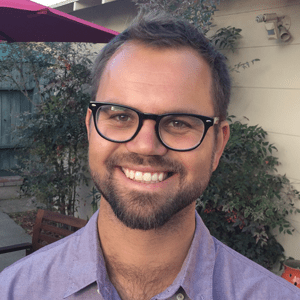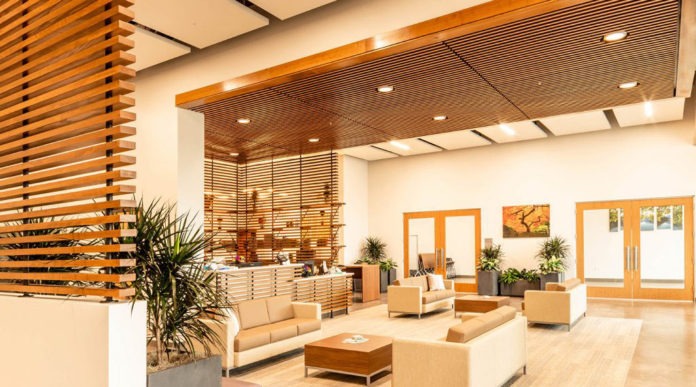Healthcare can be intimidating.

It’s often expensive, at times invasive and quick at best.
But it’s a necessity. If recent times have taught us anything, it’s that our health is precious and invaluable.
Let’s come back to this.
As a firm, we got excited when Mark Mantei, CEO of Vancouver Clinic, and his team shared their vision for the design of Vancouver Plaza Neighborhood Clinic. In short, they wanted a space that supports a transformative approach to healthcare. Their vision was to look at the barriers people face when seeking healthcare, those physical and emotional and psychological, and address them head-on with real solutions.
That was the starting point for Vancouver Plaza Neighborhood Clinic, the first of two planned neighborhood locations in partnership with Humana, both of which share the goal of improving the quality of care and access to medical services.
To give a quick overview, the clinic specializes in serving senior citizens and people living with chronic illnesses or pain. In Vancouver, with more than 15% of the local population in the 65+ age group, there is a growing need for this type of care.
Their team of 1,200 employees brings together a wide range of services, from counseling to exercise and dance classes, art therapy, pairing traditional medicine with care outside of the medical sphere, combining a place of community building with medical care.
Access as a theme
To break down the barriers to care, Vancouver Clinic has made accessibility a theme that holds true across its location, design and program.
“It was important that our facility was very accessible from a transportation standpoint,” says Mark Mantei, commenting on the site. Vancouver Plaza, a popular mall on a major bus route, is within easy reach of several retirement and assisted living facilities nearby.
Mobility can be a barrier to healthcare and self-care and other forms of social or personal enjoyment. By bringing these worlds together, the clinic essentially bridges the divide to some extent.
As an extension of this theme, we turned the clinical notion of a waiting room upside down. Instead of rows of seats in a separate hall, where one waits for their number to be called, there is comfy seating, coffee tables, places to play board games and build puzzles, and rooms for community events and wellness classes.
Designed for holistic healing
From a design standpoint, we aimed to create a calming environment, interweaving a lot of the principles that inform the design of spas and community centers. The clinic is rich in warm, natural light and earthy textures, creating a spa-like atmosphere that feels comfortable and inviting. Our goal was to design a simple, clean and enduring space; a neutral palette with lots of wood tones and pops of color introduced in more easily replaceable elements like furniture and plants.
Isolation can lead to a decrease in a person’s mental and physical health. I think a lot of people are gaining some insight into this right now. People living in retirement or assisted living facilities often do spend periods of time alone, which should be countered with nurturing social interaction. To combat the potential negative impact of isolation, the clinic offers a range of classes and activities that focus on exercise, social engagement and connection.
The LSW Interior Studio was inspired by the biophilic design elements, which provide a sense of connection to the natural world.
“Recognizing how much people’s mental and physical health is supported by a connection to the natural environment, we wanted to create a space that fosters this relationship. Conceptually, the design was inspired by a city park,” explained Susanne Ordonez, the interior designer on the project. “We utilized biophilic design elements such as natural textures, variations, daylight and plants, as well as local scenery in artwork and graphics, to create a sense of place and meaningful connection to the community.”
The design itself was also focused on the mental health and wellbeing of staff members.
“We encouraged our clients to engage their care team early during the design process with the goal of creating spaces that they would personally enjoy, as a way to promote health and wellness,” explains Chris Spurgin, project architect at LSW. “Our focus on staff wellbeing – in order to combat employee burnout – led us to provide private, well-lit and comfortable spaces to take a break or make a phone call.”
Economic access
The cost of healthcare is the elephant in every hospital or clinic. A 2019 report by HealthView Services Financial showed that couples retiring at 65 years old can expect to spend more than $387,000 for retirement healthcare costs, excluding long-term care.
“We’re working closely with insurers to design the right kinds of benefits for our patients. Making sure that the complicated process is simplified as much as possible,” Mantei explains, calling out the partnership with Humana. “It’s our hope that this results in higher access for people, especially those who would not have a primary health care physician and the social support they need in one place.”
The downstream benefits to getting more personalized care is a better response to common issues – and lower costs for all.
“From a health policy standpoint, we see that when we’re able to deliver personalized care at that level, we see the improved quality of their health for patients and costs going down,” says Mantei. “You have a strong relationship with your doctor who knows you and understands the context of your situation. And it proves to be a more effective way to deal with healthcare issues early and often.”
COVID-19, telehealth and the future
2020 has been a traumatic year – and we’re not even halfway through it. While the COVID-19 pandemic has forced us into a period of social isolation, it has also made space for conversations and ideas that did not fit into our busy schedules. And that’s a productive place to heal and plan.
Much of our worries and fears have gravitated toward the senior citizens in our lives. Parents, children, grandparents, siblings, uncles and aunts, friends, partners. For every statistic and pre-existing condition, there is a backstory and family.
With coronavirus in the background, there will be challenges to offering healthcare. A lot of the social and physical benefits to Vancouver Plaza Neighborhood Clinic are off limits right now, but access is still there.
Telehealth, an often-touted alternative, shouldn’t be seen as the antithesis of community clinics and personalized care. It’s a very useful tool and can leverage and use the care and personalization gained from the community clinic model. For one, making a call from your lounge or bedroom is a lot easier than getting onto a bus or into a car and driving to a clinic.
“Telehealth can allow access to social workers, nurses and other professionals that go beyond a typical medical visit. We’ll continue to use technology to increase access,” says Mantei. “There will always be times when it is necessary to lay hands on a patient, and I think right now, our clinic is a safe place to be – given how diligent and thorough we’re being about infection control and more. They can feel comfortable about coming and participating in things. Perhaps we won’t resume for some time until we’re sure the virus is out of our community, but we’ll be looking for opportunities all of the time.”
Positive focus
While healthcare can be intimidating, it can also be life changing and revolutionary.
Vancouver Clinic is one example of a different approach to a basic service we all need. Serving people of all income levels and situations requires a type of mindset that is more creative, humble, and empathetic than we’ve come to accept. And this is where people like Mark Mantei and his team are resetting the stage.
Clayton Truscott is a copywriter with LSW Architects in Vancouver. He can be reached at clayton@lsw-architects.com.









